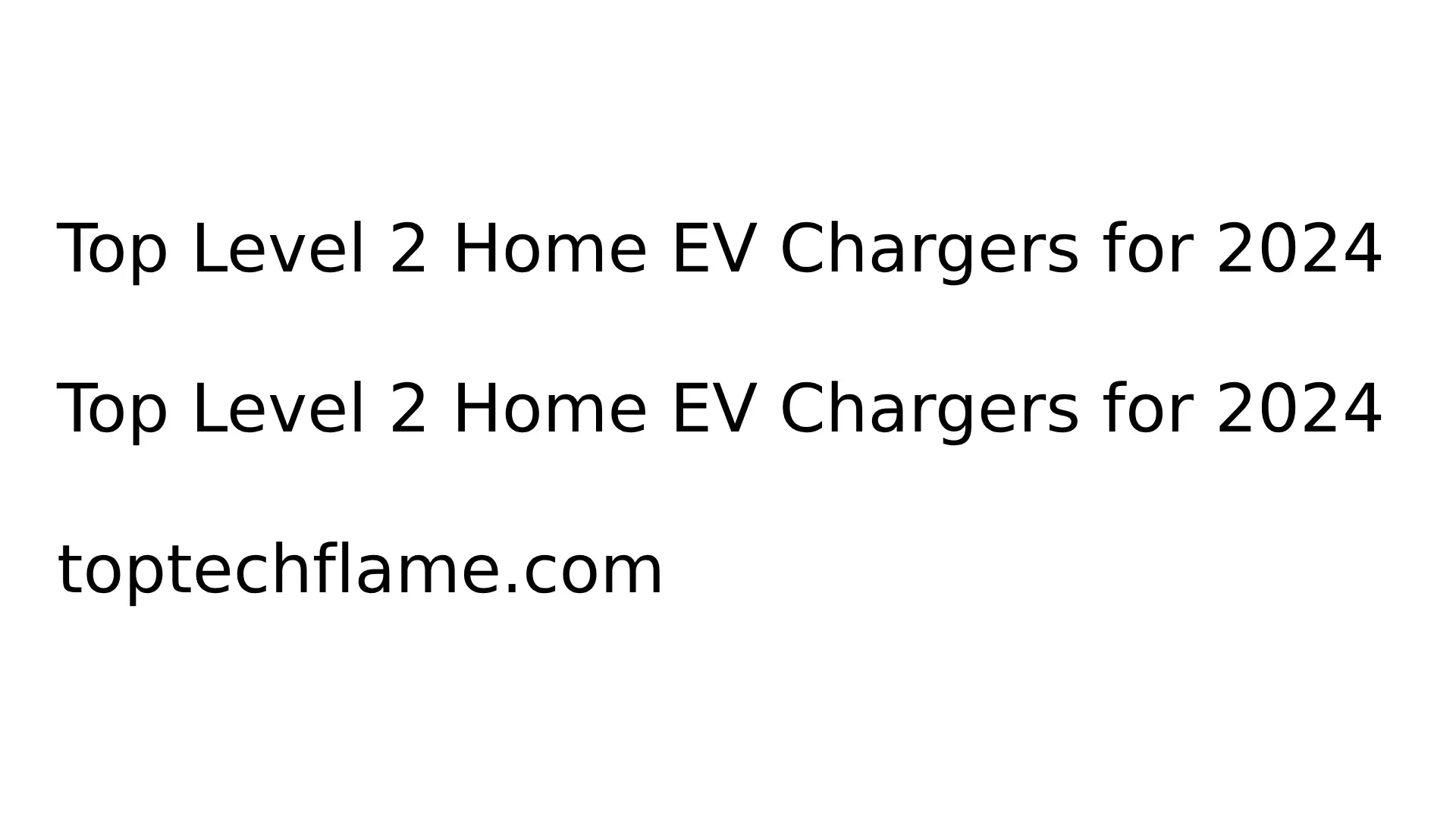EV Chargers
Electric vehicles come with many advanced technologies and a boom in demand. A convenient home charging solution is one of the needful requirements for electric cars. Many people are familiar with the basic charging setup called Level 1 charger because most models provide one by purchasing an electric vehicle. However, even though these chargers get the job done, they are slow, adding only about 2 to 3 miles of range per hour. Enter Level 2 EV Chargers that offer significantly faster charging speeds and more advanced features. As an essential update for EV owners in 2024, Level 2 EV chargers present many new upgrades over their Level 1 counterparts.
In this article, I will discuss some of the top-rated Level 2 EV chargers for 2024, trying to understand their features and benefits and why buying a Level 2 charger is one smart investment for every EV owner.
Advantages of Level 2 EV Chargers
Before getting into the top-of-the-line 2024 electric vehicle chargers, let’s take a little time to break down why you would want to upgrade your EV charger to a Level 2 over the standard Level 1 that usually comes with most electric vehicles. After all, a Level 2 EV charger is a pretty worthwhile upgrade over what usually comes in the box with most electric cars.
Faster Charging: A Level 2 EV charger can pull power from a 240-volt outlet, which enables it to charge your car much faster than a standard 120-volt Level 1 charger. A Level 2 charger can add 25 to 30 miles of range per hour. However, with a Level 1 charger, the range is added only at around 2-3 miles per hour.
Efficiency: A Level 2 EV charger will always leave you with a charged-up vehicle and no need to wait until the last minute outside the house in hopes of getting sufficient charge in time to get out of the house. It’s beneficial when driving frequently or if your vehicle is necessary for longer-trip excursions.
Electricity saving: Level 2 EV chargers have features like intelligent timers, which allow you to charge the electric vehicle during off-peak hours, thus keeping your electricity bill. They will also extend the life of the car batteries by preventing overcharging.
Home Convenience: There are many advantages to having an EV charger at home, but certainly, the top would be convenience. You do not have to rely on public charging stations anymore. Every day, every morning, your vehicle can be fully charged for another day ahead.
Now, let’s look at some of the top-rated Level 2 EV chargers available in 2024:
Top Level 2 Home EV Chargers for 2024
Charge Point Home Flex Electric Vehicle Charger
Charge Point is one of the most well-known brands in public charging networks, but it also makes one of the best home EV chargers for your vehicle. The ChargePoint Home Flex offers exceptional flexibility; its amperage will shift up to 50 amps, making it compatible with nearly any electric vehicle and electrical panel capacity.
Charging Rate: Up to 50 amps
Connectors: SAE J1772 or NACS
Installation: Hardwired and plug-in
Wi-Fi Capability: Yes. With this capability, one can monitor the charging sessions remotely. The price is around $599
One of the most impressive features is its connectivity with the Charge Point app, which users may have already downloaded on their smartphones. Controlling and monitoring charging sessions is now simple. Add schedules and enjoy cheaper electricity rates for off-peak hours.
EMPORIA Level 2 EV Charger
But if you’re looking to save money without sacrificing convenience or high-end features, then EMPORIA Level 2 EV Charger is for you. This company specializes in energy-monitoring products but at an affordable price. But that is not all; their EV charger also provides impressive value for money.
Charging Speed: Up to 48 amps
Connector Options: SAE J1772 or NACS
Installation: Hardwired or plug-in
Wi-Fi Connectivity: Yes
Price: Around $399
It is an EV charger with the unique feature of energy monitoring. You can track how much electricity you consume and even track energy prices to charge at the lowest times. The app is a bit of a hassle.
Tesla Wall Connector
The charger is designed with Tesla vehicles in mind and can be fully integrated with the Tesla app, letting you monitor and control your charging sessions.
Charging Speed: Up to 48 amps
Connector Options: NACS (Tesla proprietary)
Installation: Hardwired
Wi-Fi Connectivity: Yes
Price: Around $450
Though this charger is optimized for Tesla vehicles, it will become even more helpful once other manufacturers pick up on Tesla’s NACS connector standard. Tesla Wall Connector boasts an excellent, sleek design and goes well with a 24-foot cord, making it a convenient choice and pleasing to the eyes of any home.
Tesla Universal Wall Connector
It is highly recommended if you have a family with more than one car with different charging connectors because it supports NACS and SAE J1772 connectors. It’s great for people with both Tesla’s and non-Tesla EVs.
Charging Speed: Up to 48 amps
Connector Options: NACS and J1772
Installation: Hardwired
Wi-Fi Connectivity: Yes
Price: Around $580
The Tesla Universal Wall Connector is more expensive. Still, its flexibility with multiple EVs may make it a better choice for households with several cars—moreover, the built-in adapter locks electronically so the customer does not lose it.

Juicebox 40 Charging Station
Another top-of-the-line multi-use home EV charger option is the JuiceBox 40 Charging Station, available in 32-amp and 40-amp models. The JuiceBox charging station has Wi-Fi connectivity, making it easier for consumers to monitor and schedule charges, whether through the Juicebox app or even a web portal.
Charge Speed: 32 or 40 amps
SAE J1772 Connectors
Hardwired or plug-in installation
Wi-Fi Connectivity
Price Range: Around $597
The JuiceBox 40 is weatherproof and dust-tight, making it easy to install indoors or outdoors. It also has an in-built cable rack and a security lock for convenience and usability. As far as I understand, connecting to four JuiceBox charging stations on the same circuit in a home that operates several EVs is possible.
Key Considerations Before Buying an EV Charger
Looking at some of the best EV chargers for 2024 is relevant these days. A few key things to think about are required before making a purchase:
Compatibility: Make sure the charger you select will be compatible with your vehicle’s connector. Non-Tesla vehicles must use most types of SAES J1772 connectors, though other cars use Tesla vehicles that use the NACS connector. Some will offer both, but do your research and don’t make a decision based on reputation or name.
Installation Requirements: Level 2 chargers require a 240-volt outlet, which does not exist in most homes. You can hire a registered electrician to put in the wiring or select a plug-in model if you already have one 240-volt outlet in your home.
Wi-Fi Connectivity: Most contemporary EV chargers have Wi-Fi connecting capabilities, which allow you to monitor and control your charging from anywhere. This helps you optimize your charge schedule and save some expenses.
Cord Length: Ensure the included cord is long enough to reach your vehicle without straining it. Most cords are 20 to 25 feet long, which is adequate for most installations.
Rebates and Incentives: Check your local EV tax credits and utility rebates before you buy. Many utilities offer rebates to purchase Energy Star-certified chargers; other incentives could cover most or all the charger’s cost.
Conclusion
In 2024, EV charging stations will stand out as an investment any electric vehicle owner makes to take advantage of the maximum efficiency and convenience of home charging. Regarding fast charging speeds, multiple compatibility, or affordability, great options abound in the market.
The ChargePoint Home Flex, EMPORIA Level 2 EV Charger, Tesla Wall Connector, Tesla Universal Wall Connector, and JuiceBox 40 Charging Station all offer great features to meet other people’s needs. Installing a Level 2 EV charger always ensures your electric car is ready to run, which will give you complete peace of mind and high savings in the long run.
Knowing all your specific requirements and the need for installation will determine the best EV charger for your home. This will ensure that your vehicle gets charged perfectly and comfortably.


